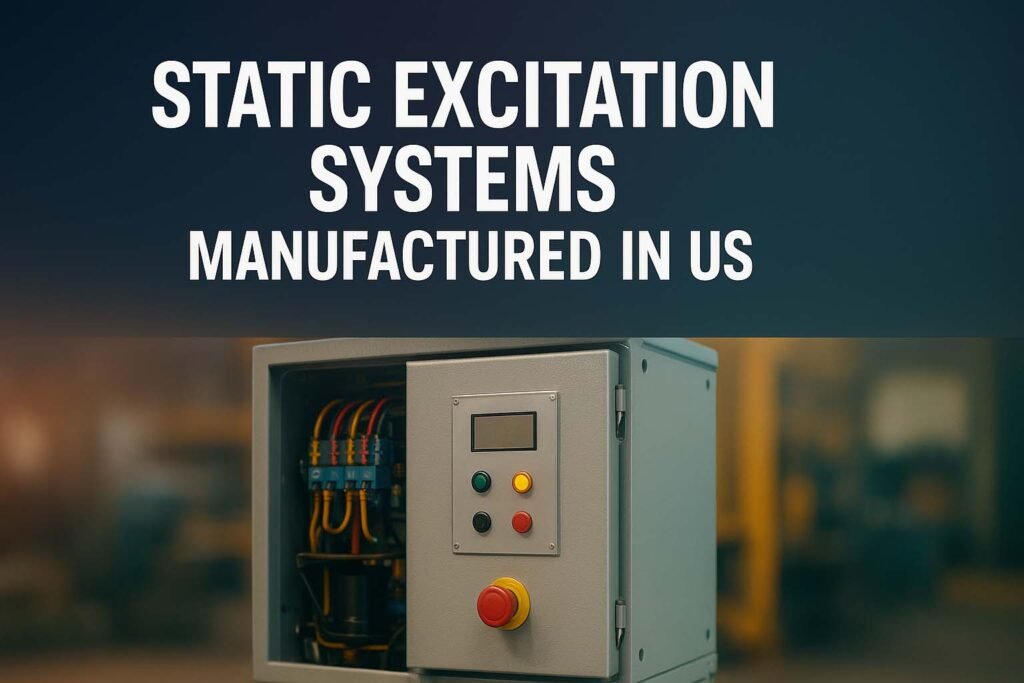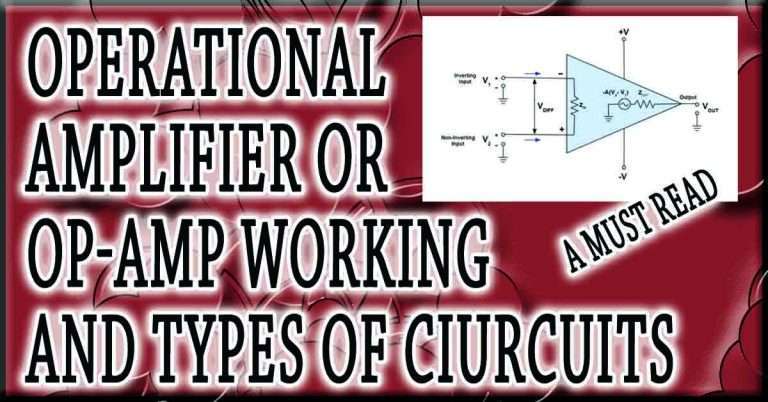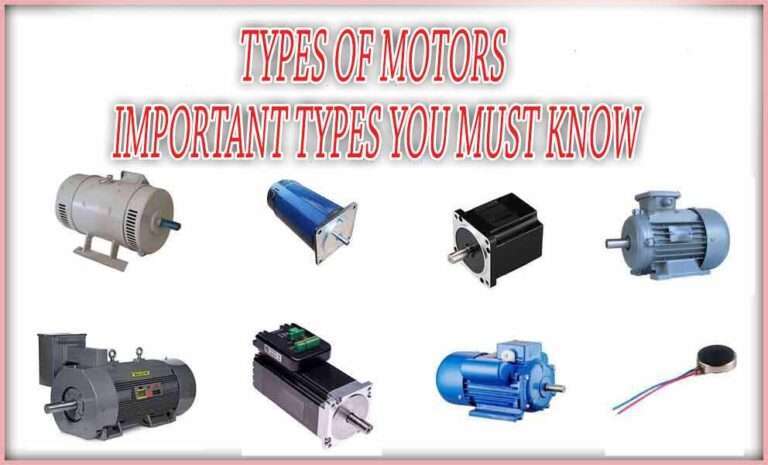Static Excitation Systems Manufactured in US
Static excitation systems manufactured in US are at the heart of modern power generation. They play a vital role in controlling the voltage and reactive power of synchronous generators. Power plants, whether hydro, thermal, or nuclear, rely on them for stability and efficiency. The US has been a leading hub for advanced static excitation systems, with manufacturers focusing on reliability, compliance with IEEE standards, and adaptability to evolving grid requirements.
Table of Contents
Table of Contents

These systems are designed to replace older brush and rotating exciters with fast-response, solid-state alternatives. The shift has improved generator performance, reduced maintenance, and enhanced safety. With energy demands rising and grids becoming more complex, static excitation systems manufactured in US provide the control backbone to keep power generation stable.
The market is competitive, driven by innovation and strict regulations. Companies in the US specialize in modular, digital control-based static excitation solutions that meet global quality standards. For utilities, industrial users, and independent power producers, sourcing from US manufacturers ensures long-term reliability and compliance with NERC, IEEE, and IEC standards.
Key Takeaways:
- Static excitation systems manufactured in US deliver reliable, fast-response voltage control for power generators.
- They replace outdated rotating exciters with modern, digital-controlled solid-state technology.
- US manufacturers lead in innovation, modular design, and compliance with international grid stability standards.
Importance of Static Excitation Systems Manufactured in US
Excitation systems control the field current of synchronous generators. Without them, voltage stability is impossible. Static excitation systems manufactured in US use thyristor bridges or IGBT converters to regulate field current quickly. This makes them superior to older systems that relied on brushes and slip rings. In power stations, they ensure smooth voltage control, reactive power management, and fast fault response.
In today’s interconnected grids, disturbances spread quickly. A robust excitation system reduces oscillations, provides fast response during faults, and prevents blackouts. The US power sector has set benchmarks for high-quality systems that support renewable integration, industrial applications, and reliable grid operations.
Know more about IEC Standard for Battery Charger – Complete Technical Guide
Technical Insights into Static Excitation Systems Manufactured in US
Static excitation systems manufactured in US generally consist of several building blocks. These include a power rectifier bridge, excitation transformer, field breaker, protective circuits, and a digital controller. The rectifier bridge converts AC from the excitation transformer into controlled DC for the generator field winding. Modern systems use redundant bridges for higher reliability.
Digital controllers manage the automatic voltage regulator (AVR), power system stabilizer (PSS), and limiter functions. These ensure the generator stays within safe operating limits. Advanced systems feature real-time monitoring, fault logging, and communication with SCADA systems. This makes remote operation and predictive maintenance possible.
The following table highlights the major components:
| Component | Function |
|---|---|
| Excitation Transformer | Steps down voltage from station bus to rectifier bridge input |
| Rectifier Bridge (Thyristor/IGBT) | Converts AC to DC, controls field current |
| Field Breaker | Provides safety isolation and fault interruption |
| Digital AVR Controller | Maintains voltage, reactive power, and system stability |
| Protection Modules | Prevents over-excitation, under-excitation, and thermal overload |
| SCADA/Monitoring Interface | Enables integration with plant control and remote diagnostics |
By manufacturing these systems domestically, US companies ensure compliance with IEEE 421.5 and IEEE 421.1 standards, which govern excitation control and performance testing.
Advantages of Static Excitation Systems Manufactured in US
The benefits of sourcing static excitation systems manufactured in US are technical and operational. Reliability is one of the strongest selling points. US manufacturers follow stringent testing and quality assurance processes. This ensures that systems can handle transient disturbances, short circuits, and sudden load changes.
Another major advantage is modularity. Many US-made systems are designed with plug-and-play modules for rectifier bridges, control units, and protection boards. This reduces downtime during maintenance and simplifies upgrades. Operators can easily expand capacity as generator ratings increase.
Know more about types of excitation system
The US focus on digitalization is also key. Advanced systems offer Ethernet, Modbus, and IEC 61850 communication. This makes them ready for smart grid integration. Utilities and IPPs can link excitation systems directly with their digital twins or predictive maintenance software.
Applications of Static Excitation Systems Manufactured in US
These systems are widely applied in various sectors. In hydroelectric power plants, they regulate voltage during fluctuating water inflows. In thermal plants, they stabilize power during heavy industrial loads. In nuclear plants, where safety is critical, US-made static excitation systems ensure redundancy and fault tolerance.
Industrial users with captive power plants also rely on them. Large steel mills, petrochemical complexes, and data centers demand stable power. Static excitation systems manufactured in US meet these needs by offering precise voltage control and reactive power management.
Another growing application is in renewable integration. Wind and solar plants connected to synchronous condensers use excitation systems for voltage stabilization. With renewable penetration rising, demand for these systems in hybrid grids is increasing rapidly.
Know more about abb excitation system
Comparison of US vs Non-US Manufactured Static Excitation Systems
To highlight the strengths of static excitation systems manufactured in US, consider the comparison below:
| Feature | US Manufactured Systems | Non-US Manufactured Systems |
|---|---|---|
| Compliance with IEEE/NERC | High | Varies by manufacturer |
| Reliability Testing | Rigorous, standardized | Often less standardized |
| Modularity | Common feature | Less common in budget solutions |
| Digital Integration | Advanced, IEC 61850 ready | May lack smart grid compatibility |
| Local Support in US | Strong service network | Limited support, higher downtime |
| Price | Moderate to high, but value-driven | Lower upfront, higher lifecycle cost |
This comparison shows why many utilities and industries prefer US-made solutions, even if the initial cost is slightly higher. Lifecycle value and compliance often outweigh upfront savings.
Know more about what is static excitation system
Leading Manufacturers of Static Excitation Systems in US
Several companies are prominent in designing and delivering high-quality systems. Firms like Basler Electric, GE Grid Solutions, Emerson, and Brush US are among the recognized leaders. Each has decades of expertise in synchronous generator excitation.
Basler Electric is well known for its digital AVRs and integrated excitation control systems. GE Grid Solutions focuses on modular and scalable platforms suitable for large utilities. Emerson provides solutions with high emphasis on industrial automation integration. Brush US designs excitation systems tailored for high-reliability markets like nuclear power.
These companies invest heavily in R&D, ensuring that their systems adapt to changing power sector needs. Cybersecurity, redundancy, and predictive analytics are areas where US manufacturers lead.
Future Trends in Static Excitation Systems Manufactured in US
The future is moving toward smarter, more connected systems. With grid operators requiring faster fault response and more flexible reactive power support, US manufacturers are integrating artificial intelligence into excitation control. Predictive maintenance using machine learning is also on the horizon.
Another trend is energy storage integration. Excitation systems may soon work alongside battery energy storage to balance grid frequency. In hybrid renewable projects, excitation systems will play a role in stabilizing weak grids.
Cybersecurity is also a growing focus. US manufacturers are implementing advanced encryption and intrusion detection in digital AVRs. This is critical as grid control systems face cyber threats.
Know more about static excitation system of alternator
Why Choose Static Excitation Systems Manufactured in US
For operators deciding on new or replacement systems, choosing static excitation systems manufactured in US ensures long-term stability. With strict adherence to IEEE standards, proven reliability, and advanced digital features, they represent the safest investment.
Even though some international alternatives may seem cost-effective, the lifecycle costs often tilt in favor of US-made solutions. Downtime, repair delays, and compliance risks can outweigh initial savings. US systems are backed by strong service support and technical expertise.
In industries where uptime is critical, like nuclear plants or data centers, compromise is not an option. Choosing static excitation systems manufactured in US provides peace of mind and operational excellence.
Conclusion
Static excitation systems manufactured in US remain the backbone of generator voltage control and grid stability. They combine cutting-edge solid-state technology with advanced digital control, ensuring reliable performance across hydro, thermal, nuclear, and industrial applications. With compliance to international standards, modular design, and digital readiness, US-made systems stand apart from global competitors.
Know more about function of excitation system
As grids become more complex and renewable penetration rises, the demand for robust and intelligent excitation systems will only grow. US manufacturers are already leading this transformation by integrating smart grid compatibility, cybersecurity, and predictive maintenance. For power producers and industrial operators, investing in static excitation systems manufactured in US means securing reliability, efficiency, and compliance for decades ahead.
Follow Us on Social:
Subscribe our Newsletter on Electrical Insights for latest updates from Electrical Engineering Hub
#StaticExcitationSystems, #ExcitationSystems, #PowerGenerationEquipment, #USManufactured, #ElectricalEngineering, #GeneratorExcitation, #PowerPlantSolutions, #EnergySystems, #IndustrialAutomation, #MadeInUSA, #ElectricalSystems, #TurbineGenerators, #ExcitationControl, #PowerReliability, #EngineeringInnovation


